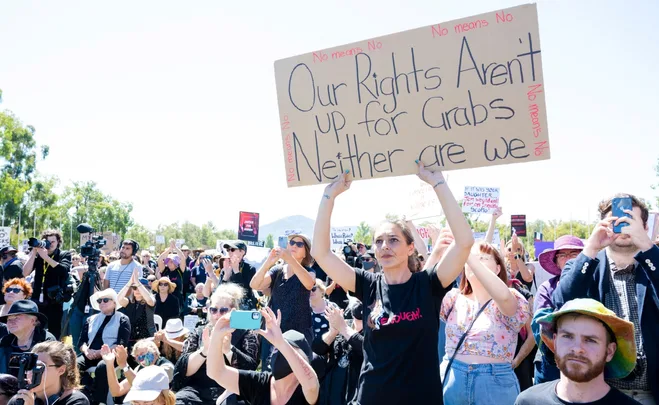Canberra will take a giant leap forward in reforming its consent laws, with Labor backbencher Marisa Paterson set to introduce an affirmative consent model to the ACT legislative assembly this week.
The bill, which was backed by advocate Brittany Higgins, would bring a legislative shift in the way people can legally obtain consent. An affirmative consent model stipulates a person needs to take active steps to ensure they have established whether another person wants to have sex before they engage in the act.
“We have a chance to address the systemic issues of sexual violence and improve access to justice for all victim-survivors,” Higgins said of the bill.
“This is an acknowledgement that we are all responsible to seek enthusiastic consent. Someone isn’t saying ‘yes’ just because they don’t say ‘no’ or do not physically resist.”
She added: “Victim-survivors have lived silently with the trauma of sexual violence for too long. These reforms will seek to deliver systemic reform that will assist them in getting the justice they deserve.”

Marisa Paterson also detailed the milestone reform for the state: “I think this reform will deliver some kind of justice to victim-survivors of sexual assault in the ACT.”
“We’ll be delivering a bill that is really thorough.”
An affirmative consent bill would turn the previous legislation on its head—in the past, some perpetrators have avoided conviction because the victim hasn’t given a reasonable-enough indication that they aren’t consenting.
The landmark case of Saxon Mullins revealed a major flaw in the former modelling—the freeze response. A man she accused of raping her outside a Kings Cross nightclub in Sydney was acquitted in 2017 due to the fact that Mullins had “frozen” at the time, which was reasonable grounds for the man to believe she was consenting.
But as Mullins, who later bravely spoke out and became an advocate for survivors, pointed out: Some victims present the ‘freeze’ response when they are in a situation of fear (as opposed to fight or flight), which means they may be unable to say “no” or “stop” to the perpetrator.
Affirmative consent laws in other states
In November 2021, New South Wales became the second Australian state after Tasmania to strengthen its laws around consent.
Victoria quickly followed suit by introducing an affirmative consent bill later than month.
It came after an 18-month examination by the Victorian Law Reform Commission, which found that sexual violence was widespread and heavily under-reported. It also found that victims of sexual violence needed better support and protection during the reporting and judicial process.
Victoria’s Attorney-General Jaclyn Symes said of the findings: “This landmark report highlights just how much work there is to do to deliver a justice system that works for victim-survivors.”
“It’s an enormous job—and we’ll work closely with those who know this issue best to get it done. To victim-survivors, we hear you. The system must change. This is too important not to act.”
Here’s hoping this continues across all other states in Australia.










